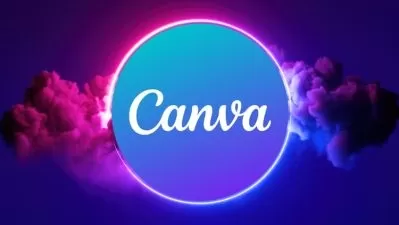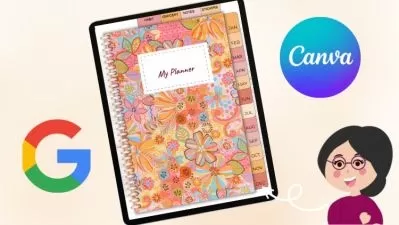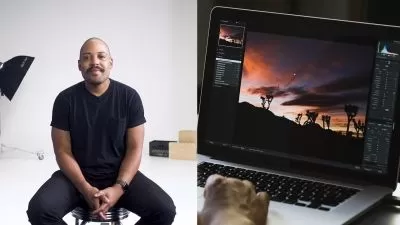Master Canva for Photographers and photo Editors
John Walker
2:09:09
Description
Learn the Ways That Photographers Can Use Canva to Better their Skills
What You'll Learn?
- Resizing Images for Social Media Posts
- Making Basic Edits to Your Pictures
- Creating Collages of Your Best Work
- Creating Posters
- Making Templates for Your Website
- Making Calendars That Feature Your Images
- Putting Together a Photography Book
- Creating a basic Logo for Your Photography Business
- Creating a 3D Logo for your business
- Publishing an Image to Social Media (eg Facebook)
Who is this for?
More details
DescriptionIntroduction
As your photography becomes more advanced, you might want to do more than simply take pictures. Since you’ve already got an eye for creativity and know what looks good, why not try designing other areas of your business? You can also think of unique ways to sell your work.
If you choose to expand your creative horizons, Canva is an excellent tool to help you get started. You’ll find plenty of free tools that you can use to bring your ideas to life, and exporting elsewhere takes little time.
While photography is one of the best hobbies you can have, the idea that there’s no money in it is not true. Many photographers have built sustainable, profitable, and fulfilling careers based on the work they love to do.
1. Creating Logos for Your Photography Business
Creating a logo isn’t necessary for the early stages of running a photography business. But at some point, you will probably want to have something that portrays your personal branding. When the time comes to do that, something simple will suffice.
You can easily create a logo in Canva, and doing so only takes a few minutes. You’ll find plenty of templates, but making one from scratch is also pretty simple.
2. Resizing Images for Social Media Posts
You can use several social media platforms to grow your presence as a photographer. For example, despite its significant shift toward video, Instagram remains an excellent place to share pictures. Twitter has also gained popularity among photographers during the early 2020s, and Pinterest is another tool with plenty of possibilities.
You’ll need to consider each platform’s dimensions when using social media as a photographer. Manually resizing everything is time-consuming if you choose a tool like Lightroom; you can reduce the time of this process in Canva.
Canva has various already-sized templates for different social media platforms. You can drag and drop your images into these before cropping and exporting.
3. Making Basic Edits to Your Pictures
If you’re really into photography, you’ll probably use editing software like Adobe Lightroom or Capture One. But if you only want to make basic edits to your photos, Canva is a pretty handy tool.
When using Canva, you can easily add numerous filters to your pictures. On top of that, you can adjust many settings that you would also be able to in Lightroom or Capture One, such as saturation and brightness.
If you’re going to use Canva for editing pictures, we recommend you first use your preferred editing software for RAW files. For JPEGs and on-the-go editing, you might find that Canva is more convenient than other tools.
4. Creating Collages of Your Best Work
Admittedly, collages might not be as popular as they were in the pre-Instagram carousel days. However, you might still want to use them for several reasons. They’re useful if you want to add multiple pictures to a single Instagram Story post, for example—and you’ll also find it easier to show people your best work.
Canva gives you several opportunities to make collages, and you can do so in all kinds of settings. You can choose from several templates if you want to outsource some of your creativity, and the free version has multiple options.
If you want full creative control, you can make collages from scratch using Canva. You can drag and drop shapes and visuals, in addition to changing colors and more.
5. Creating Posters
When creating physical products, many photographers begin by hanging their own work up in their homes and studios. If you’re thinking about the same but only want to experiment for now, why not try making posters?
Canva has several poster templates. Some of these include text boxes, allowing you to add words and other niceties. However, you will also find some that simply include pictures—but have borders around the edges.
6. Making Templates for Your Website
Have you decided that you’re wholeheartedly diving into professional photography? If so, you should strongly consider making a website. Creating a photography website will make it easier for you to show others what you do, which could result in more projects. Moreover, you can lay out your work however you feel is authentic to you.
If you don’t want to use the selection of templates that many site builders give you, you can use Canva instead. The tool has several themes, including more vivid and colorful ones alongside subdued and minimalist versions.
Once you’re done, you’ll need to upload it to whichever system you use. The process to do so will vary; make sure it’s possible full-stop before you start creating.
7. Making Calendars That Feature Your Images
Even with the rise in smartphone calendar apps, many people enjoy having a physical version somewhere in their house. And seeing as most of these feature photos of people or places, you might want to consider making your own or one for gifting to someone.
Canva has a wide range of templates you can use as physical calendars. And if you’re not interested in the whole printing process, you can also use the tool to make simple online ones that you can use as a wallpaper.
8. Putting Together a Photography Book
Many photographers dream of having their work featured in a published book. And while it’s still tricky today, obtaining such a feat has never been easier. While Canva isn’t a replacement for working with a publisher, you can use the service to make mockups of what you’d like to make.
Similarly, Canva has several templates for making notebooks—which is an ideal starting point. And if you decide to share your photography expertise with others, you can always use one of the platform’s many eBook designs.
In this Canva Series, IÂ will go through all these steps and how you can take your Photography Business/ Hobby to the Next Level.
This Lesson will be added as time goes by (all for free) and as Canva developers advances Canva Software.
Enrol and Learn from what IÂ have been able to accomplish.
Cheers,
Johnnie Walker
Who this course is for:
- Photographers
- Journalists
- Graphic Designers
- Content Creators
- Artists
- Anyone interested in Photography and photo manipulation
Introduction
As your photography becomes more advanced, you might want to do more than simply take pictures. Since you’ve already got an eye for creativity and know what looks good, why not try designing other areas of your business? You can also think of unique ways to sell your work.
If you choose to expand your creative horizons, Canva is an excellent tool to help you get started. You’ll find plenty of free tools that you can use to bring your ideas to life, and exporting elsewhere takes little time.
While photography is one of the best hobbies you can have, the idea that there’s no money in it is not true. Many photographers have built sustainable, profitable, and fulfilling careers based on the work they love to do.
1. Creating Logos for Your Photography Business
Creating a logo isn’t necessary for the early stages of running a photography business. But at some point, you will probably want to have something that portrays your personal branding. When the time comes to do that, something simple will suffice.
You can easily create a logo in Canva, and doing so only takes a few minutes. You’ll find plenty of templates, but making one from scratch is also pretty simple.
2. Resizing Images for Social Media Posts
You can use several social media platforms to grow your presence as a photographer. For example, despite its significant shift toward video, Instagram remains an excellent place to share pictures. Twitter has also gained popularity among photographers during the early 2020s, and Pinterest is another tool with plenty of possibilities.
You’ll need to consider each platform’s dimensions when using social media as a photographer. Manually resizing everything is time-consuming if you choose a tool like Lightroom; you can reduce the time of this process in Canva.
Canva has various already-sized templates for different social media platforms. You can drag and drop your images into these before cropping and exporting.
3. Making Basic Edits to Your Pictures
If you’re really into photography, you’ll probably use editing software like Adobe Lightroom or Capture One. But if you only want to make basic edits to your photos, Canva is a pretty handy tool.
When using Canva, you can easily add numerous filters to your pictures. On top of that, you can adjust many settings that you would also be able to in Lightroom or Capture One, such as saturation and brightness.
If you’re going to use Canva for editing pictures, we recommend you first use your preferred editing software for RAW files. For JPEGs and on-the-go editing, you might find that Canva is more convenient than other tools.
4. Creating Collages of Your Best Work
Admittedly, collages might not be as popular as they were in the pre-Instagram carousel days. However, you might still want to use them for several reasons. They’re useful if you want to add multiple pictures to a single Instagram Story post, for example—and you’ll also find it easier to show people your best work.
Canva gives you several opportunities to make collages, and you can do so in all kinds of settings. You can choose from several templates if you want to outsource some of your creativity, and the free version has multiple options.
If you want full creative control, you can make collages from scratch using Canva. You can drag and drop shapes and visuals, in addition to changing colors and more.
5. Creating Posters
When creating physical products, many photographers begin by hanging their own work up in their homes and studios. If you’re thinking about the same but only want to experiment for now, why not try making posters?
Canva has several poster templates. Some of these include text boxes, allowing you to add words and other niceties. However, you will also find some that simply include pictures—but have borders around the edges.
6. Making Templates for Your Website
Have you decided that you’re wholeheartedly diving into professional photography? If so, you should strongly consider making a website. Creating a photography website will make it easier for you to show others what you do, which could result in more projects. Moreover, you can lay out your work however you feel is authentic to you.
If you don’t want to use the selection of templates that many site builders give you, you can use Canva instead. The tool has several themes, including more vivid and colorful ones alongside subdued and minimalist versions.
Once you’re done, you’ll need to upload it to whichever system you use. The process to do so will vary; make sure it’s possible full-stop before you start creating.
7. Making Calendars That Feature Your Images
Even with the rise in smartphone calendar apps, many people enjoy having a physical version somewhere in their house. And seeing as most of these feature photos of people or places, you might want to consider making your own or one for gifting to someone.
Canva has a wide range of templates you can use as physical calendars. And if you’re not interested in the whole printing process, you can also use the tool to make simple online ones that you can use as a wallpaper.
8. Putting Together a Photography Book
Many photographers dream of having their work featured in a published book. And while it’s still tricky today, obtaining such a feat has never been easier. While Canva isn’t a replacement for working with a publisher, you can use the service to make mockups of what you’d like to make.
Similarly, Canva has several templates for making notebooks—which is an ideal starting point. And if you decide to share your photography expertise with others, you can always use one of the platform’s many eBook designs.
In this Canva Series, IÂ will go through all these steps and how you can take your Photography Business/ Hobby to the Next Level.
This Lesson will be added as time goes by (all for free) and as Canva developers advances Canva Software.
Enrol and Learn from what IÂ have been able to accomplish.
Cheers,
Johnnie Walker
Who this course is for:
- Photographers
- Journalists
- Graphic Designers
- Content Creators
- Artists
- Anyone interested in Photography and photo manipulation
User Reviews
Rating
John Walker
Instructor's Courses
Udemy
View courses Udemy- language english
- Training sessions 14
- duration 2:09:09
- Release Date 2023/03/09















